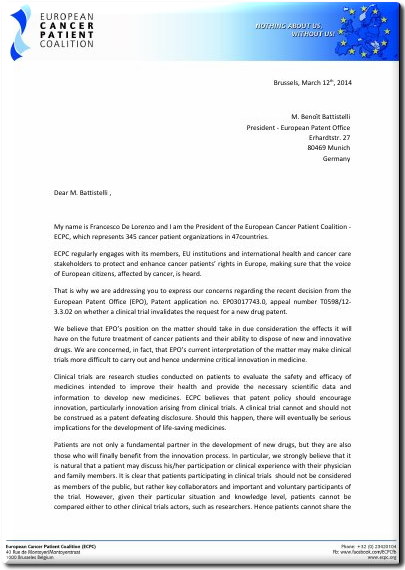

Brussels, March 12th, 2014
M. Benoît Battistelli President - European Patent Office Erhardtstr. 27 80469 Munich Germany
Dear M. Battistelli,
My name is Francesco De Lorenzo and I am the President of the European Cancer Patient Coalition - ECPC, which represents 345 cancer patient organizations in 47 countries.
ECPC regularly engages with its members, EU institutions and international health and cancer care stakeholders to protect and enhance cancer patients’ rights in Europe, making sure that the voice of European citizens, affected by cancer, is heard.
That is why we are addressing you to express our concerns regarding the recent decision from the European Patent Office (EPO), Patent application no. EP03017743.0, appeal number T0598/12-3.3.02 on whether a clinical trial invalidates the request for a new drug patent.
"That is why we are addressing you to express our concerns regarding the recent decision from the European Patent Office (EPO), Patent application no. EP03017743.0, appeal number T0598/12-3.3.02 on whether a clinical trial invalidates the request for a new drug patent."We believe that EPO’s position on the matter should take in due consideration the effects it will have on the future treatment of cancer patients and their ability to dispose of new and innovative drugs. We are concerned, in fact, that EPO’s current interpretation of the matter may make clinical trials more difficult to carry out and hence undermine critical innovation in medicine.
Clinical trials are research studies conducted on patients to evaluate the safety and efficacy of medicines intended to improve their health and provide the necessary scientific data and information to develop new medicines. ECPC believes that patent policy should encourage innovation, particularly innovation arising from clinical trials. A clinical trial cannot and should not be construed as a patent defeating disclosure. Should this happen, there will eventually be serious implications for the development of life-saving medicines.
"We are concerned, in fact, that EPO’s current interpretation of the matter may make clinical trials more difficult to carry out and hence undermine critical innovation in medicine."Patients are not only a fundamental partner in the development of new drugs, but they are also those who will finally benefit from the innovation process. In particular, we strongly believe that it is natural that a patient may discuss his/her participation or clinical experience with their physician and family members. It is clear that patients participating in clinical trials should not be considered as members of the public, but rather key collaborators and important and voluntary participants of the trial. However, given their particular situation and knowledge level, patients cannot be compared either to other clinical trials actors, such as researchers. Hence patients cannot share the same confidentiality responsibility as researchers: this would, in fact, represent an unfair burden over the patients’ shoulders, which does not match patients’ level of biomedical and scientific understanding of clinical trials nor the reason for which they participate in them.
"ECPC believes that patent policy should encourage innovation, particularly innovation arising from clinical trials. A clinical trial cannot and should not be construed as a patent defeating disclosure."Aside from the pure legal perspective, it is to be expected that EPO decision on the 2013 case mentioned before, if implemented, will lead to reduced transparency and/or delay of implementation of new clinical trials, which are both to the detriment of patients’ interests. Reducing transparency will threaten the access to investigational drugs that clinical trials provide for patients. This access is of critical importance for cancer patients, particularly for those whose only treatment option may be a clinical trial.
Alternatively, delaying clinical trials until patent applications are filed, will add undue delay to the very time consuming process of developing a new medicine that could improve patients’ lives. Such patent policy also excludes any innovation that arises during a clinical trial.
"Aside from the pure legal perspective, it is to be expected that EPO decision on the 2013 case mentioned before, if implemented, will lead to reduced transparency and/or delay of implementation of new clinical trials, which are both to the detriment of patients’ interests."In conclusion, we strongly believe that the invention or findings related to a clinical trial should not be considered as “made available to the public” only because patients participate actively to the aforementioned trial. The patients’ unique status, in between collaborators and beneficiaries, makes them a key and vulnerable stakeholder, whose necessities are to be protected. Therefore, we would be glad to engage with EPO and all other relevant stakeholders in order to re-discuss the legal status and responsibilities of patients enrolled in clinical trials.
ECPC also believes that research should be encouraged and that public policy should remove barriers to the conduct of clinical trials, while keeping very high security standards and ensuring ethical conduct.
We hope that you will re-examine the decision in question for the benefit of patients. We remain at your disposal to further discuss the issue.
Sincerely,
Prof. F. De Lorenzo